This introduction to the new cookbook Ed Mitchell’s Barbeque explains how the pitmaster got into he business and how it came to shape his life.
by Ed Mitchell | photographs by Baxter Miller
“I Can’t Give Up” by Ed Mitchell
My journey into the barbeque business began with a lunch I made for my mama. It was 1991. I was a forty-five-year-old man grieving the loss of my hero and trying to survive without the patriarch of our family. I hadn’t realized my father was as sick as he was. He had terminal cancer, and one night he just slipped away. My mother called me and I came home quickly to be with her. He and Mama had been a team — Black entrepreneurs in a racially divided part of North Carolina. Their grocery store, Mitchell’s Supermarket, was filled with everyday goods from penny candy to cooking oil. It was a symbol of African American progress and Black-owned business.
But without my dad there, friends stopped popping by, and business slowed down.
Early that morning, I dropped by the store to check in on Mama. She wasn’t herself. Ever since my dad’s death, my mom hadn’t been as jovial as she used to be. I will never forget when she told me, “I’ve been here all day and I only sold seventeen dollars in food.” I knew I had to step up and take care of my mama as the eldest son in the family. I didn’t mind — I’ve always been a mama’s boy. I wanted to make my mother feel better and let her know that she could count on me. So I did what came naturally to us Mitchells: I asked her what she wanted to eat. Mama said, “I have a taste for some good old-fashioned barbeque.”
I knew what that meant, so I got my hands on a thirty-five-pound pig — that’s a small one. I rolled my parents’ rustic cooker into the parking lot of their grocery and fired up the coals.
While the pig cooked, Mama prepared some Eastern North Carolina coleslaw and slowly braised collards. Soon, the smoke filled the air and the pork skin started to crackle. We seasoned and chopped it up on the meat counter in the back, and the fresh barbeque smell permeated the storefront. Our customers, the few we had left, asked, “Y’all selling barbeque now?” Mama looked at me in silence for a moment, then said, “Yes, we are selling barbeque.” She fixed the customer a barbeque sandwich. They must have told a few others, because soon we had a line form and all thirty-five pounds of our hog was gone.
That evening, as I was closing up the store, I heard someone shaking the door. Thinking we were about to be robbed, I put on my best James Earl Jones voice to address the intruder. Low and behold, it was a customer from earlier trying to get another barbeque sandwich. I told him, “We don’t have any more barbeque but we will have some more tomorrow.”
Wilson, North Carolina, is no stranger to barbeque. I would say our small rural town is a founding bedrock to the tradition of whole-hog barbeque and growing tobacco. It’s home to two of the largest barbeque joints in the state, Parker’s Barbecue and Bill Ellis Barbeque. Parker’s claims to serve roughly 20,000 pounds of barbeque weekly.
However, with the commercialization of the food industry starting in the 1960s, locals no longer barbequed the traditional way, using natural, farm-raised hogs. Most barbeque restaurants were using store-bought, farm-raised pork shoulders, cooked over gas instead of coal fires, and the flavor wasn’t the same.
The next day, I bought a slightly larger pig and repeated our whole-hog-barbe-que-for-sale experiment. Little by little, our production increased. I put aside my other hustles and decided to help my mama full-time, building the business with my brothers, Aubrey and Stevie. By the early 1990s, I had transformed Mitchell’s Supermarket into Mitchell’s Ribs, Chicken & Bar-B-Q. We never looked back.
I had no idea that lunch with Mama would shape the rest of my life —that my family’s Eastern North Carolina barbeque would take me around the world to become one of the most internationally recognized barbeque pitmasters. From 2002 until 2018, I was invited year after year to headline the Big Apple Barbecue Block Party in New York City. Famous food writers like Michael Pollan and Peter Kaminsky, and chefs like Anthony Bourdain and Bobby Flay, traveled to Wilson to learn how Ed Mitchell, Willie and Doretha’s son, cooked whole hogs, the traditional way.
I never considered the possibility of making a living as a pitmaster because barbeque was just a way of life for us.
We celebrated it through family, church functions, and events. No one I knew who actually owned anything had ever made a career of it. All the Black men I knew had to stay in the back, cook, and keep their heads down — they weren’t allowed to own businesses.
Yet what Mama and I saw that day at our lunch was a way to bring customers back and make them proud of our heritage. Barbeque was the answer to our prayers. It kept our family afloat, both financially and spiritually. I will never forget that moment when everything changed for our family.
It felt like my grandfather and father were my guardian angels.
For me, barbeque has always been synonymous with celebrations. When I was a kid in the 1950s, we barbequed to celebrate family achievements and things like the end of the tobacco harvest season. It was the only time during my childhood when Blacks and whites ate side by side. For a brief moment, we were colorblind, and I never forgot that feeling.
The next time I experienced it was in Vietnam, when guys around me were being wounded and killed. The only way we were going to get home alive, besides our prayers, was by watching one another’s backs. I’ve realized that when we have a common need to exist, everything else goes out the window: color, ethnicity, religion, gender, anything that can be divisive.
Barbeque still has that power today. Drive an hour southeast from Wilson to Pete Jones’s Skylight Inn BBQ in Ayden, North Carolina, and inside you’ll see whites and Blacks eating whole-hog barbeque together. In my generation, that particular part of North Carolina was rife with racial tension, and for our safety, we stayed away as much as possible. Today, you see Black, whites, and every color eating barbeque together. Every time I go down there, I think of that.
And yet for many, barbeque is a topic as controversial as race or religion. Together, these make up three pillars of our Southern identity that are intricately linked — each person fervently believing that his or hers is the best. Each region stakes claim to its own barbeque style based on animal type, cut of meat, charcoal, wood, and sauce.
I’ve tried, as many pitmasters do, to embrace these differences and focus on the beauty of what barbeque means — peace and good eating. As a result, I’ve often overlooked the fact that to me, barbeque is African American food.
My enslaved ancestors stood over their enslavers’ pits. They were always connected to the land, by force and by ancestral wisdom they carried over on ships. They grew collards in their small gardens, and those collards provided the vitamins for them to survive through the worst of times.
Plantation owners handed offal — chitlins, pickled pigs’ feet, snouts, and ears — to the field hands. And the enslaved cooked them to perfection, until they became delicacies. My matriarchal ancestors were plantation chefs, the skilled cooks who created the soul food that fed the American South from the mid-1600s until well after the antebellum period.
So why, then, are only a handful of African American entrepreneurs barbequing whole hog today? Rodney Scott in Hemingway, South Carolina; Dr. Howard Conyers in Manning, South Carolina; and Bryan Furman in Atlanta, Georgia are some of the great ones.
But look around. Most of the pitmasters on the barbeque circuit are white. There are countless books on barbeque, but show me an African American author telling the story of his or her ancestors and their food. Is it because African Americans consider this type of work too reminiscent of the servitude of their ancestors, or is it because starting a barbeque restaurant today takes hundreds of thousands of dollars? Systemic racism permeates the food and agriculture business, so resources and interest play a part. I reckon it’s a bit of both.
As far back as I can remember, and even still today, Black-owned restaurants in Wilson would sneak a barbeque sandwich on the menu and serve it as a side. We just knew that they had the power to make sure that we never owned a full-scale barbeque restaurant even though we were doing all the cooking at every plantation barbeque and political rally, and in their kitchens.
After Daddy died in 1991 and I decided barbeque was my career and legacy, I got in it to win it. When we designed our menu, we were intentional about adding dishes that we served in our home. Traditional dishes that so many Black families in Wilson ate at home or at a pig pickin’, a traditional North Carolina barbeque. Daily, we served collard greens with backbones, ribs, pigs’ feet, cracklin’, and so much more.
My son, Ryan, got involved out of necessity. Now that Mitchell’s BBQ was a full-time job, we needed all hands on deck. I insisted that he learn the craft and earn those Air Jordans his generation loved to wear.
I barbeque not because I love hoisting 150-pound hogs over my shoulders, but because I want to keep the tradition of my African American ancestors alive. My decision to team up with my son was strategic. The minute he showed interest in my work, I wanted him involved, because barbeque has always been a family affair to me. I wanted him to come home after he experienced working for corporate America. I needed Ryan’s help to move this family business forward.
When he was in college, Ryan told me, “I want to own five or six restaurants.” I encouraged him to pursue a degree in business and economics so he could help me run the restaurant, reminding him that the family business was his legacy.
I was so glad that he came on board to help me out. I know a lot of fathers whose children aren’t interested in the family business. God truly blessed me. It was challenging for me without his help. I was tired. The management side, on top of cooking every day, was a lot to manage.
Today, I barbeque to show young African Americans that our history lies in those embers. I wear overalls and a baseball cap, like those worn by my grandfather Lawyer Sandars and other Black men from previous generations, to remind me of the sacrifices of the men who wore this uniform, who worked the land and provided for their families.
It makes me realize that the work I do, while it can seem futile at times, is important. After all, I am one of the last barbeque pitmasters who knows how to cook a whole hog like my ancestors did.
This is an excerpt from Ed Mitchell’s Barbeque by Ed Mitchell and Ryan Mitchell, published by Ecco on June 6, 2023.
This article originally appeared in the June 2023 issue of WALTER magazine.

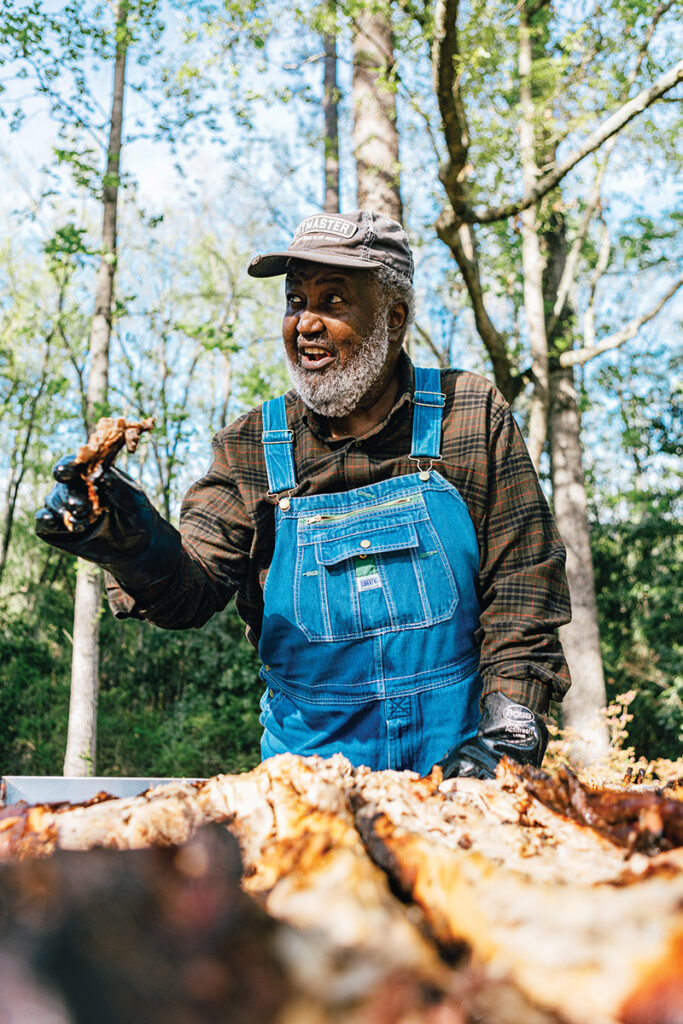
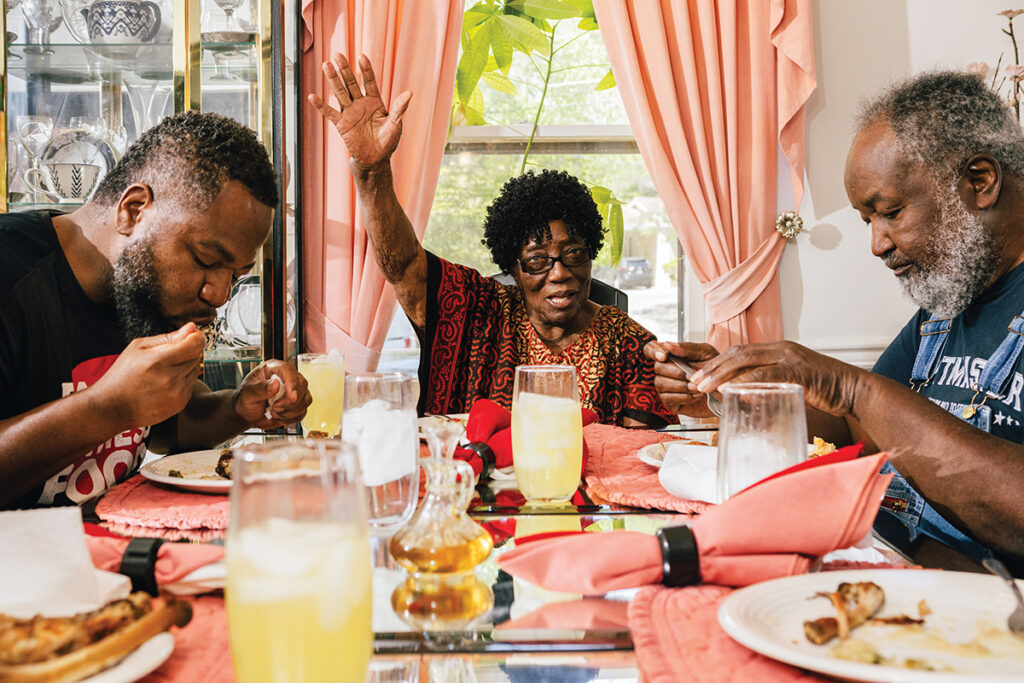
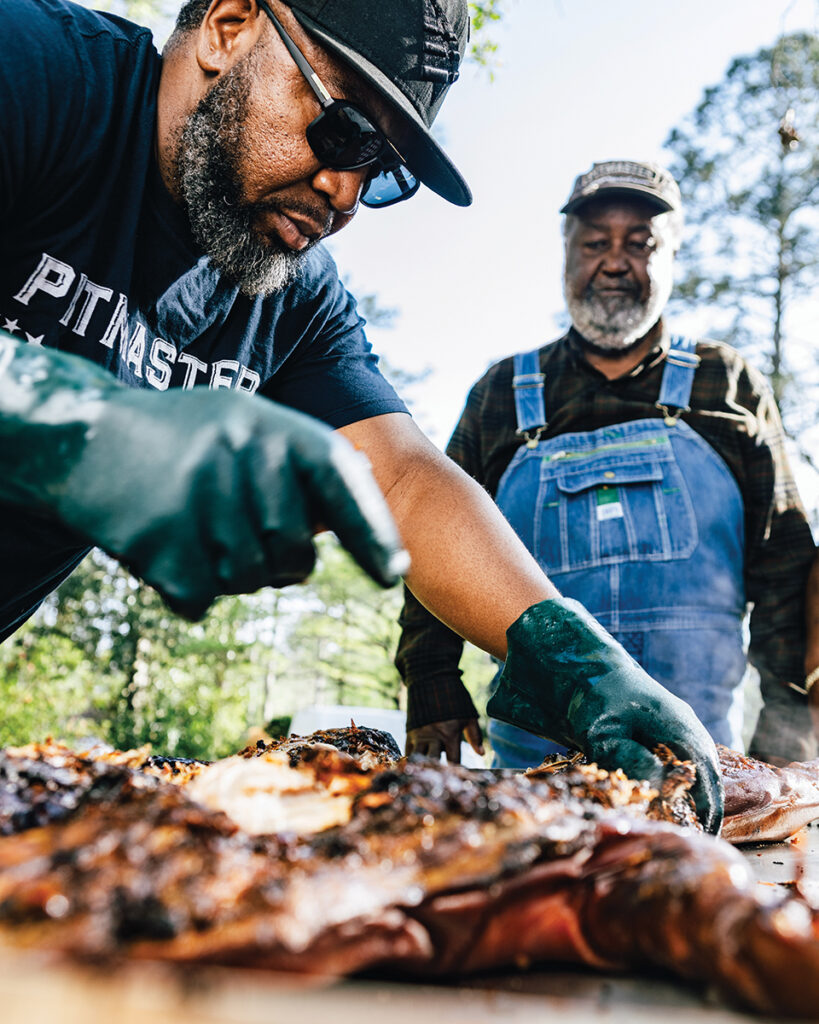
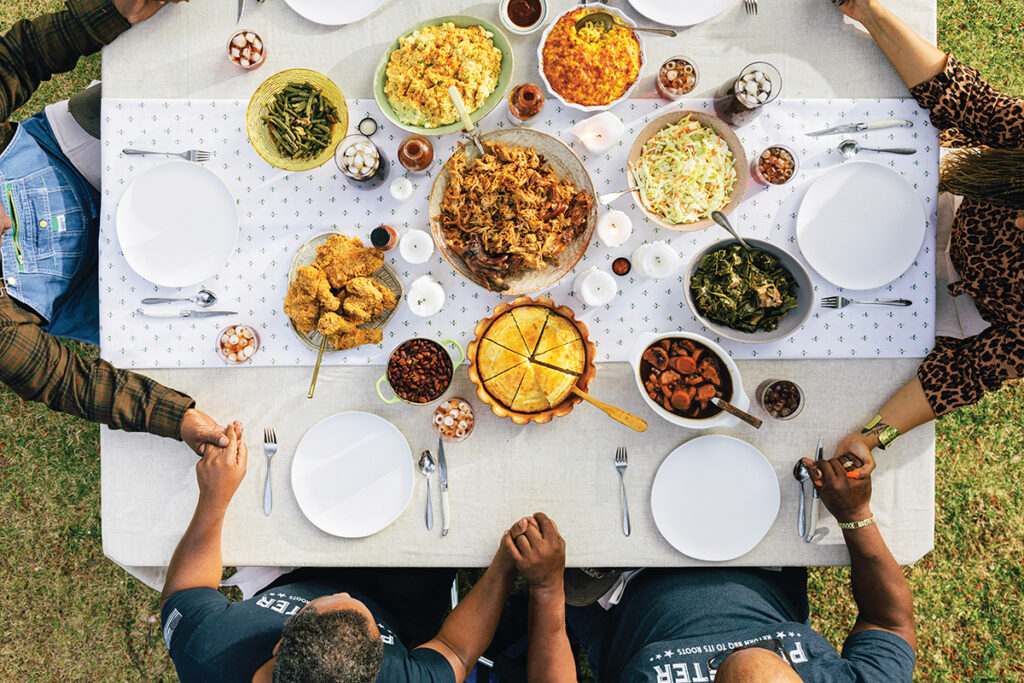
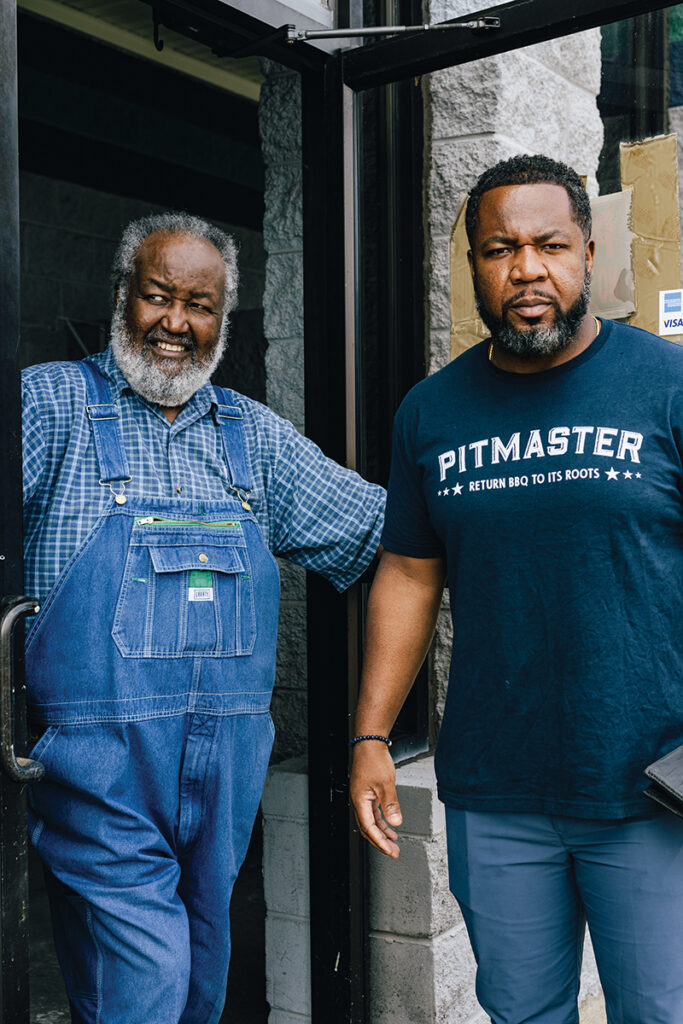

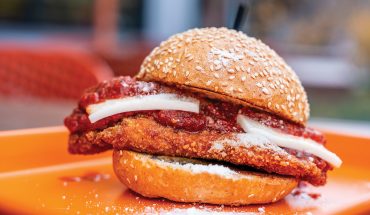

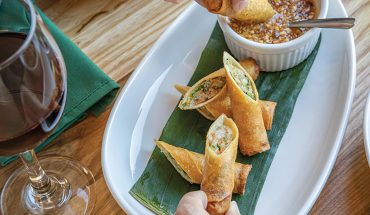
Pingback: Smoke & Fire: Ed and Ryan Mitchell’s New Cookbook - WALTER Magazine